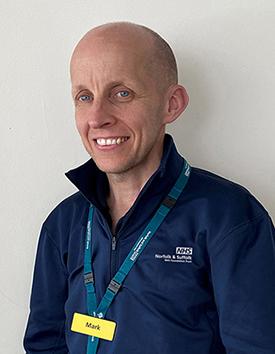You are here
Health care support workers week: Mark’s journey from graphic design to the NHS
20 October 2023
 Mark Raine - Care Support Worker (CSW) at Wedgewood House, part of Suffolk and Norfolk NHS Foundation Trust.
Mark Raine - Care Support Worker (CSW) at Wedgewood House, part of Suffolk and Norfolk NHS Foundation Trust.
Mark worked as a graphic designer for 20 years. When the pandemic hit his job came to an end and he looked for a new role. His only caring experience at that point was looking after his daughter who has Downs Syndrome, autism and learning difficulties. Inspired by his caring responsibilities he applied, interviewed and accepted a role.
After initial training he became a trainee care support worker at Northgate Ward, an adult inpatient ward located at Wedgwood House in West Suffolk. The ward looks after men and women over the age of 18, providing treatment and care for people with acute mental health illnesses in West Suffolk.
Getting started
Unlike my old job, sitting at a computer from 9-5, every day is different. It was such a big change that I initially doubted I had the skills and ability. But I soon realised that the key was to get to know the patients, build a rapport so they trusted me. With this I could better understand their needs and support them.
On a typical day
Every day is different but it normally starts with a handover where I listen to the previous shift’s update, so I know who the patients are and their needs.
During the day I spend time with patients helping them with their recovery, having 1:1’s, supporting them with any problems or when they are feeling low. I take patients out to go shopping or for home visits. I encourage and help patients participate in ward activities such as going to the gym, arts and crafts and cooking. I will also help them maintain relationships with family and friends assisting visitors when they come to the ward.
Along with the other CSW’s I carry out therapeutic observations to ensure the safety and wellbeing of each patient. This involves either observing or engaging with each patient at least once every hour.
What’s important in your role as a HCSW?
To be a HCSW you need a passion for caring for people, commitment, enthusiasm and to be able cope with challenging situations at times. We are the people that spend the most time with the patients, we see them at their best and worst during their recovery. We are often who patients will come to first when they need support on the ward.
What do you enjoy most?
Building a rapport, getting to know the patients so they feel they can trust you and approach you when they are struggling. Being a part of their recovery and seeing them get better, smile and laugh for the first time and feeling positive about their future. I enjoy working as part of a team with great colleagues, providing the best care and support to our patients.
What has working as a HCSW taught you about yourself?
The role has given me a lot more confidence. In my last job working as a graphic designer in an office, I worked a lot on my own and didn’t really interact much with colleagues outside my immediate team. My role now as a healthcare assistant means I get the opportunity to engage with a wide range of people and professionals. This in turn has really built up my people skills.
What would you say to someone considering a career in the NHS?
If you have a passion for caring for people, the HCSW job role is a good entry point into the NHS you will receive all the training you need for the position, you are encouraged to progress and to have a long and fulfilling career. In my opinion, there’s not many other jobs that will give you this amount of job satisfaction.
Find out more about the healthcare support work role on the Health Careers website.